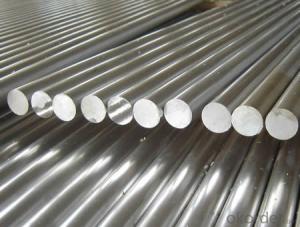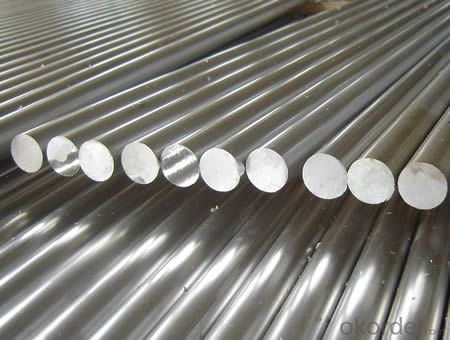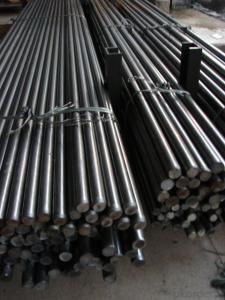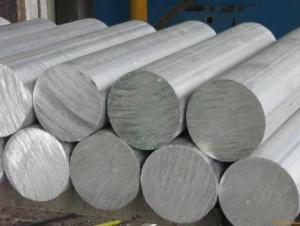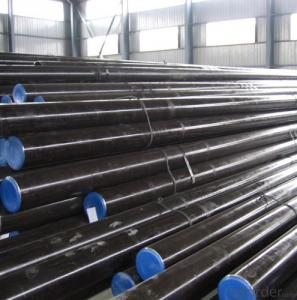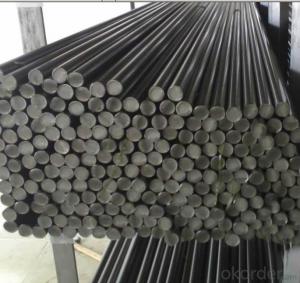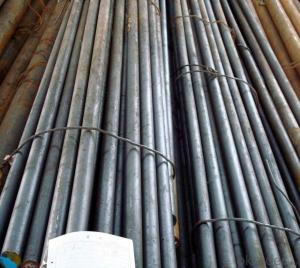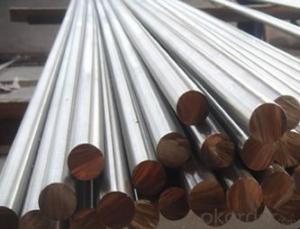High Quality Spring Steel Round Bar 18-25mm
- Loading Port:
- China main port
- Payment Terms:
- TT or LC
- Min Order Qty:
- 100 m.t
- Supply Capability:
- 10000 m.t/month
OKorder Service Pledge
OKorder Financial Service
You Might Also Like
High Quality Spring Steel Round Bar 18-25mm
Product Description:
Spring Steel can be divided into two types. One is carbon spring steel, and other one is alloy spring steel.
Alloy spring steel is based on carbon spring steel, by adding one or more alloying elements to improve the mechanical properties, hardenability and other properties to meet the requirement for manufacture all kinds of spring steel.
Specification of High Quality Spring Steel Round Bar 18-25mm:
-Material: 1065
-Standard: ASTM
-Production: Hot rolled or cold rolled
-Type: Spring Steel
| Diameter(mm) | Mass(kg/m) | Section(mm2) |
| 18 | 2.00 | 254.34 |
| 20 | 2.47 | 314 |
| 25 | 3.85 | 490.625 |
Corresponding Steel Grade of High Quality Spring Steel Round Bar 18-25mm for Reference:
USA, ASTM | CHN, GB/T | JPN, JIS | ISO |
1065 | 65 | SWRH67A SWRH67B | Type SC Type DC |
FRA, NF | GBR, BS | ||
C66D | C66D |
Chemical Composition of High Quality Spring Steel Round Bar 18-25mm:
C | Mn | Ni | Si |
0.62~0.70 | 0.50~0.80 | ≤0.30 | 0.17~0.37 |
P | S | Cr | Cu |
≤0.035 | ≤0.035 | ≤0.25 | ≤0.25 |
Mechanical Properties of High Quality Spring Steel Round Bar 18-25mm:
-Tensile Strength σb (MPa): ≥695
-Yield Strength σs (MPa): ≥410
-Elongation δ10(%): ≥10
-Percentage reduction of area: ψ (%): ≥30
-Hardness HBS, no heat treatment: ≤255
Usage/Applications of High Quality Spring Steel Round Bar 18-25mm:
-ASTM1065, is medium-high carbon spring steel. After heat treatment, this type of steel obtains high strength, hardness and elasticity but this material isn’t perfect for welding.
-Its fatigue strength is equal to alloy spring steel when they are in same configuration.
-For manufacturing spring, spring circle, all kinds of grommet, clutch, and axels in the production of normal machine.
Packaging & Delivery of High Quality Spring Steel Round Bar 18-25mm:
-Packing Detail: The products can be packed in bundles by steel wires.
-Marks: There are two types of marks. One is color mark and other one is tag mark. We paint color marks on both ends of bundles to make sure that it’s more convenient for customers to distinguish their products from other products at the destination port. The tag marks will be tied up to each bundle to make sure that customers know the specifications of each bundle like product’s name and size and other information of products.
-Delivery Detail:
1, Delivery time: 30~60 working days after receive buyer’s T.T. or L/C.
2, Delivery status should be written in the contract. (Heat treatment or no)
FAQ:
Q1: Why buy Materials & Equipment from OKorder.com?
A1: All products offered byOKorder.com are carefully selected from China's most reliable manufacturing enterprises. Through its ISO certifications, OKorder.com adheres to the highest standards and a commitment to supply chain safety and customer satisfaction.
Q2: How do we guarantee the quality of our products?
A2: We have established an advanced quality management system which conducts strict quality tests at every step, from raw materials to the final product. At the same time, we provide extensive follow-up service assurances as required.
Q3: How soon can we receive the product after purchase?
A3: Within three days of placing an order, we will arrange production. The shipping date is dependent upon the quatity, how many sizes you want and the plan of production, but is typically 1 month to 2 month days from the beginning of production.
Images of High Quality Spring Steel Round Bar 18-25mm:
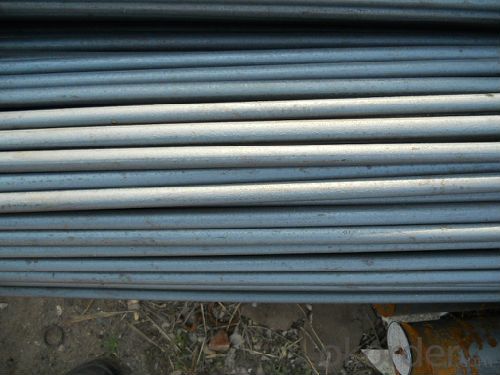
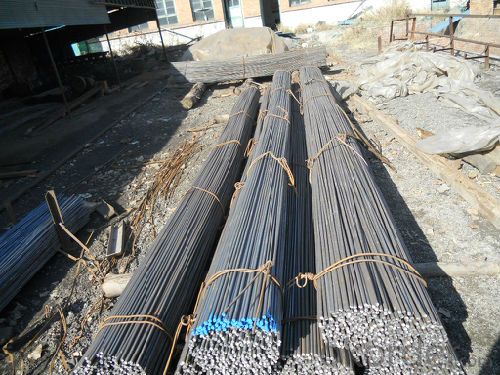
*If you would like to get our price, please inform us the size, standard/material and quantity. Thank you very much for your attention.
- Q: Is special steel resistant to wear and abrasion?
- Yes, special steel is known for its high resistance to wear and abrasion. Special steel is often manufactured with specific alloying elements and heat treatment processes that enhance its hardness and toughness. These properties make it highly resistant to the detrimental effects of wear and abrasion, making it suitable for applications that require durability and longevity. Special steels are commonly used in industries such as automotive, aerospace, construction, and manufacturing, where components are subjected to harsh environments or repetitive mechanical actions that can cause wear and abrasion.
- Q: What are the main factors affecting the hardness of special steel?
- The hardness of special steel is influenced by various factors. Let's explore some of the key ones: 1. Carbon content plays a vital role in determining the hardness of steel. The addition of carbon, known as a hardening element, enhances the strength and hardness. Generally, higher carbon content leads to increased hardness. 2. The presence of alloying elements like chromium, manganese, nickel, and tungsten also impacts the hardness of special steel. These elements interact with the steel, forming compounds and solid solutions that enhance hardness and strength. 3. The hardness of steel is significantly affected by the heat treatment process. This involves subjecting the steel to specific heating and cooling cycles. Quenching, a rapid cooling process, transforms the microstructure of the steel, resulting in increased hardness. On the other hand, tempering reduces hardness while improving toughness. 4. The crystal structure of the steel can also influence its hardness. For instance, during quenching, the formation of martensite, a hard and brittle structure, increases hardness. Alternatively, crystal structures like ferrite or pearlite may exhibit lower hardness. 5. The size of grains within the steel's microstructure can impact its hardness. Smaller grain sizes generally lead to higher hardness due to improved strength and limited dislocation movement within the material. 6. Work hardening, which occurs through processes like rolling or forging, can increase the hardness of steel. This phenomenon happens when dislocations in the crystal lattice become trapped and hinder further dislocation movement, resulting in increased hardness. 7. The presence of impurities or non-metallic inclusions in steel can affect its hardness. These impurities can act as stress concentrators, reducing the material's hardness. To achieve the desired hardness for specific applications, it is crucial to consider and carefully control these factors during the manufacturing process of special steel.
- Q: What are the factors that affect the weldability of special steel?
- The factors that affect the weldability of special steel include the chemical composition of the steel, the presence of impurities or alloying elements, the heat treatment history, the thickness of the steel, the welding process and technique used, and the pre-weld and post-weld treatments.
- Q: What are the different grades of special steel?
- Special steel is classified into various grades based on its chemical composition, physical properties, and intended use. Some common grades include tool steel, stainless steel, alloy steel, and high-speed steel. These grades offer unique characteristics and are utilized in different industries such as manufacturing, construction, automotive, and aerospace.
- Q: How is nitrogen alloyed steel used in the production of high-strength bolts?
- Nitrogen alloyed steel is used in the production of high-strength bolts to enhance their mechanical properties and increase their strength. By adding nitrogen to the steel, it improves the hardness, toughness, and corrosion resistance of the bolts. This makes them suitable for applications that require high tensile strength and durability, such as in construction, automotive, and aerospace industries.
- Q: How does special steel contribute to the fatigue resistance of products?
- Special steel contributes to the fatigue resistance of products by providing enhanced strength, durability, and resistance to wear and tear. The unique composition and manufacturing processes of special steel result in improved mechanical properties, such as higher tensile strength and hardness, which help products withstand repeated loading and stress cycles without failure. Additionally, special steel can be engineered to have specific microstructures that enhance its resistance to fatigue, preventing the growth of cracks and ensuring longer product lifespan.
- Q: Can special steel be used in the automotive racing industry?
- Yes, special steel can be used in the automotive racing industry. Special steel alloys, like high-strength steels or heat-resistant steels, are commonly utilized to enhance performance, durability, and safety in racing vehicles. These specialized steels offer superior strength-to-weight ratios, improved mechanical properties, and resistance to extreme temperatures, making them ideal for various automotive racing applications such as chassis, suspension components, engine parts, and exhaust systems.
- Q: How does special steel contribute to the mining aftermarket industry?
- The mining aftermarket industry heavily relies on special steel to improve durability, strength, and resistance in extreme conditions. This particular type of steel is explicitly engineered to withstand the demanding environments and heavy loads associated with mining operations. Within the mining aftermarket industry, special steel is utilized to manufacture a wide range of equipment and components, including drill bits, cutting tools, crusher parts, and wear plates. These components endure intense wear and tear due to the abrasive materials present in mining. Special steel, possessing exceptional hardness and toughness, guarantees that these components can endure harsh conditions and maintain peak performance for extended periods. Moreover, special steel facilitates the creation of more efficient and productive mining equipment. By implementing high-strength steel alloys, manufacturers can design lighter equipment without compromising on strength and durability. This outcome leads to increased productivity and reduced operating costs for mining companies. Special steel also contributes significantly to the safety of mining operations. The robustness and reliability of steel components reduce the risk of unforeseen failures, which can result in accidents and downtime. Additionally, special steel exhibits resistance to extreme temperatures, corrosion, and other environmental factors commonly encountered in mining, minimizing the need for frequent replacements and repairs. In conclusion, special steel is indispensable to the mining aftermarket industry as it provides the essential strength, durability, and resistance to extreme conditions required for mining equipment and components. Its presence enhances productivity, lowers operating costs, and ensures the safety of mining operations, making it a crucial material within the mining industry.
- Q: What are the different surface coating techniques for special steel?
- Some of the different surface coating techniques for special steel include electroplating, hot-dip galvanizing, powder coating, thermal spraying, and chemical vapor deposition.
- Q: Can special steel be used in the defense industry?
- Yes, special steel can be used in the defense industry. Special steel, such as high-strength steel or armor-grade steel, possesses unique properties that make it suitable for various defense applications. It can be used for manufacturing military vehicles, aircraft components, body armor, ballistic plates, and other defense equipment that require enhanced strength, durability, and resistance to extreme conditions. Special steel's ability to withstand impacts, provide protection against projectiles, and maintain structural integrity makes it an essential material in the defense industry.
Send your message to us
High Quality Spring Steel Round Bar 18-25mm
- Loading Port:
- China main port
- Payment Terms:
- TT or LC
- Min Order Qty:
- 100 m.t
- Supply Capability:
- 10000 m.t/month
OKorder Service Pledge
OKorder Financial Service
Similar products
Hot products
Hot Searches
Related keywords
